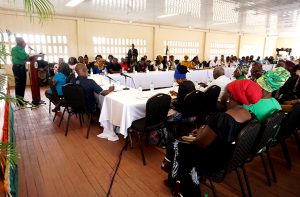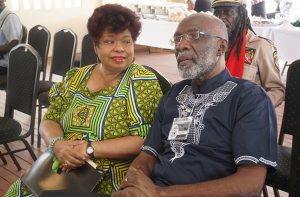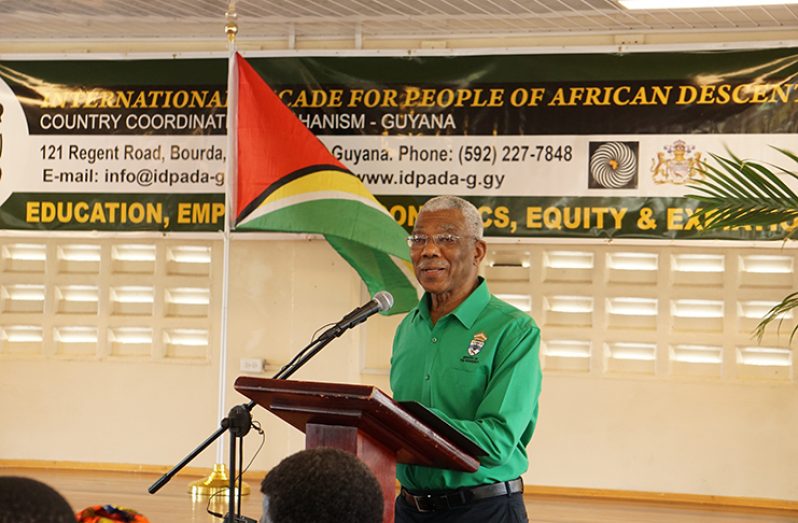– President tells Afro-Guyanese forum
TO date, people of African descent across the world continue to face hurdles to equal treatment and opportunities but these individuals, including Afro-Guyanese, must collectively pursue education for the protection of their rights.
This was the message of President David Granger at the Second Annual General Meeting of the International Decade for People of African Descent Assembly- Guyana (IDPADA-G) hosted at the Guyana Industrial Training Centre (GITC) on Sunday.

“Education has been one of the outstanding contributions of African-Guyanese to the nation. Education, next to economic liberation, was the greatest gift of emancipation. African-Guyanese embraced education as a means of providing a better life for themselves, their families and future generations… the African-Guyanese contribution to education played an important part in national integration and should be sustained, not supplanted,” the President said.
He made these remarks in the presence of Minister of Social Protection, Amna Ally; Minister within the Ministry of Social Protection with responsibility for Labour, Keith Scott; representatives of member organisations of the local Assembly and other specially invited guests.
The International Decade for People of African Descent (2015-2024) was proclaimed by the United Nations (UN) as it recognised the need to strengthen cooperation for the full enjoyment of economic, social, cultural, civil and political rights by people of African descent. The President stated that IDPADA-G presents an important opportunity for Guyanese to be educated about their past.
Over 200 million Africans reside in the Caribbean and the Americas but many of them are still affected by racism, the President said. “People of African descent still face barriers as a result of social biases and discrimination present in public-private institutions. We must remember that some of the authors of that crime against humanity have never apologised; have never paid reparations…for the crime they committed for 400 years,” he said.
Nonetheless, the Head of State said groups such as IDPADA-G are charged with ensuring that the importance of the preservation of African culture is understood. “The clock is ticking and we are half way through the decade,” the President reminded.
“The Decade is a unique opportunity for African-Guyanese to concentrate their collective experiences and energies, so that we could bequeath to our children and grandchildren a better Guyana than we inherited,” he added.
While listing what he considers as the five movements of development in Guyana–the emancipation movement, the village movement, the political movement, the labour movement and the cultural movement–President Granger noted that the latter created the foundation on which Guyana was built.
The Head of State told the gathering that he is proud of the work that IDPADA-G has been doing to promote the study of Guyanese history in schools, and is confident that it will do its best to preserve the legacy of education in Guyana. “IDPADA-G has a mission, an obligation, a duty to conduct this sort of education, because you cannot solve a problem if you do not know the nature of the problem,” he said.
“The international decade was conceived and planned to remedy the legacy of discrimination, of disempowerment and dispossession… but the international decade, I iterate, identified education as an important vehicle for empowering persons of African descent. We cannot move forward without arming ourselves, equipping ourselves with these educational tools,” he added.

President David Granger, himself, launched the local General Assembly in 2015 prior to taking office, while Guyana’s Parliament approved a subvention of $100M for IDPADA-G in 2019.
When he spoke, IDPADA-G Chairman Vincent Alexander congratulated the General Assembly’s members for staying the course over the years, and encouraged them to recommit themselves to service. He stated that one of IDPADA-G’s key roles is interaction with the state for the purpose of introducing policies, programmes and projects which influence various sectors, social issues and education.
Alexander reminded the attendees that they are also responsible for doing their individual parts to effect change in their communities and in various interest groups for greater impact.
Meanwhile, a presentation of the General Assembly’s annual report by Chief Executive Officer (CEO) Olive Sampson showed that membership of the General Assembly has grown by five new groups since the last year. She thanked the President and his ministers for the provision of an annual subvention, which enables the General Assembly to continue its work and welcomed a continuance of the partnerships shared with various ministries during projects.
IDPADA-G is also in the process of setting up a credit union for individuals and small- business owners working in collaboration with the UN IDPAD. Some 500 persons have completed the application process thus far, while applicants continue to be processed daily at IDPADA-G’s Secretariat for a 2020 official launch.
IDPADA-G has afforded persons the opportunity to learn African languages; it largely influenced the visit of Ghanaian President Nana Akufo Addo to the Square of the Revolution; collaborated with the National School of Music for preservation of the drumming culture in schools; hosted an oil and gas forum, business conferences for small farmers and leadership and captivity building camps; has examined the loss of African heritage and ancestral lands and more. Meanwhile, before the end of the function, IDPADA-G’s Draft 2020-2024 Strategic Plan was presented and new elections were conducted.





.jpg)








